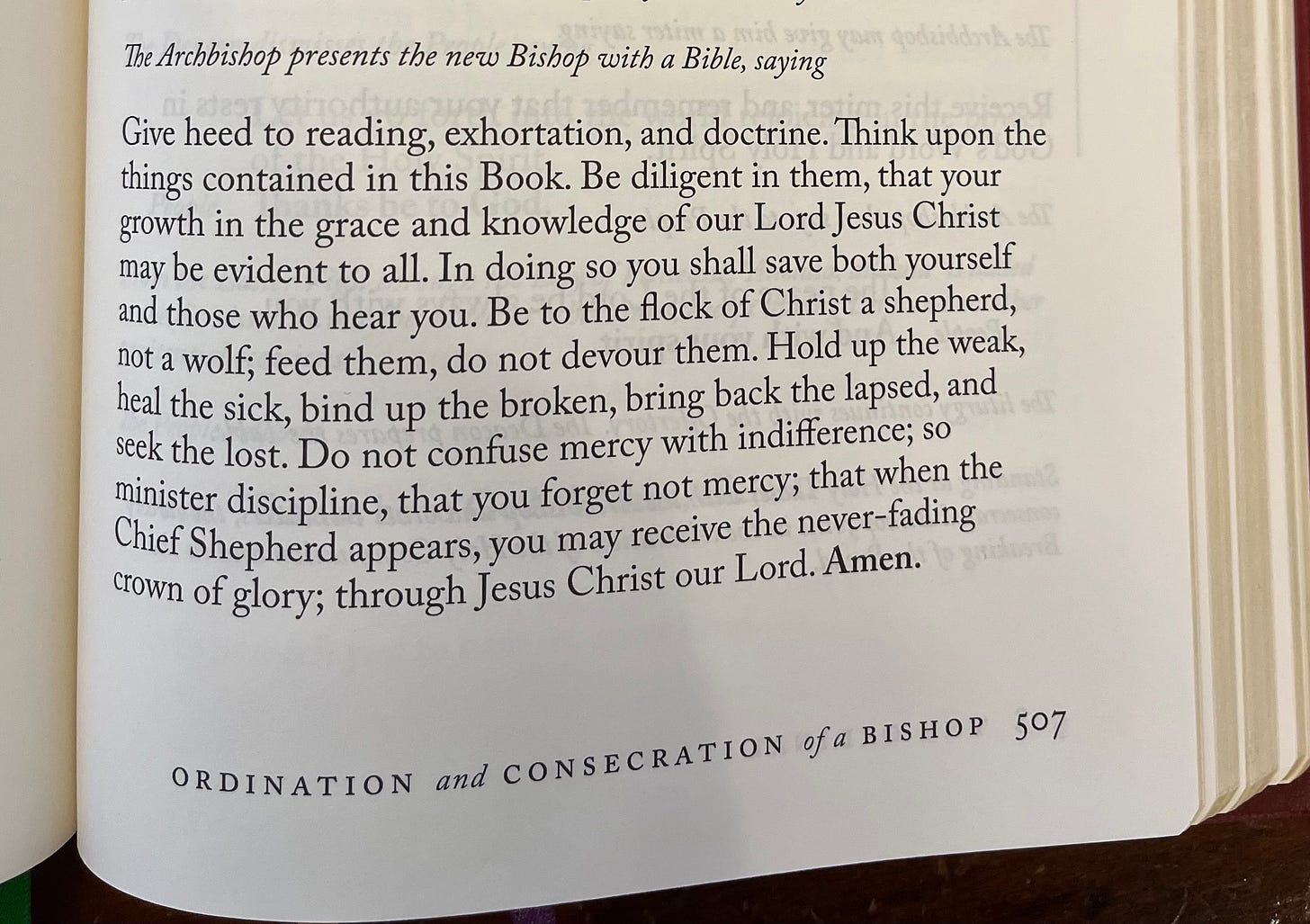When One Part of the Body Suffers, We All Suffer
Apocalyptic Unveilings of Abuse in the Church Call Us to Bear Witness, to Engage, and to Work for Justice
For the love of everything good, churches must stop giving leaders endless second chances. Today finds me witnessing yet another apocalyptic unveiling, this time in my own corner of the church, as an investigative report from The Washington Post, details things that have been kept long hidden in church basements, among dusty personnel files, and by the whispered consultations of church leaders.
It’s not because of lack of effort by survivors and advocates to be heard. Victims allege that an Anglican priest named Jeff Taylor assaulted boys and young men in the youth group he led starting at least in the mid-90s. Church leaders in The Episcopal Church (who would become leaders in The Anglican Church in North America) were aware by the early 2000s. Taylor went on to “serve” at two other churches with overlapping impact on TEC and ACNA, where various other concerns and alarms were raised…and ignored for too long.
What an utter failure that leaders received complaints, even identified their own red flags, and were unwilling to end Taylor’s ministerial career immediately upon receipt of the very first credible claim.
Instead, a man’s sense of personal calling was given more weight than the safeguarding and well-being of the vulnerable. I will never get over this inverted framework, as though ministry is about greatness and personal fulfillment rather than sacrifice and service and “I must become less.”
Christian communities must be done with the era of leaders believing themselves to be omnicompetent, with pastors and volunteers internally “handling” things as seems best to them.
One of Taylor’s victims explained how, when he courageously came forward, he trusted his then-priest Fr. John Yates to know how to properly handle things. This is so understandable. Parishioners and congregants do trust their spiritual leaders, and the American church has a deeply entrenched belief that pastors have special, almost gnostic, knowledge into any and every kind of situation. And pastors continue to play into that, often rejecting outside expertise and instead relying on their own judgment and instincts, even in situations that outpace their experience and competence.
Fr. John Yates did not inform the congregation, there was not a successful attempt to create space for additional victims to come forward, and, in fact, over a decade later when middle-aged men who had been in that youth group pleaded with Yates to re-investigate matters, Yates did not.
Neither did Fr. Alfred Sawyer, Taylor’s rector and supervisor at the church where he next “ministered,” do well. Sawyer heard about the allegations from Yates, but, for unknown reasons, did not find these allegations sufficient enough to fire Taylor. Instead, Sawyer switched Taylor’s job responsibilities to oversee family life ministry.
WHAT.
Then there’s the fact that Bp. Frank Lyons, who did eventually inhibit Taylor (an inhibition prohibits a priest from ministering), still permitted a multiple-times-over, credibly accused clergyman to simply quietly resign his Holy Orders without public notification of concerns. OUTRAGEOUS. What are we even doing? Do episcopal vows include safeguarding the flock entrusted to their care or not?
I’m angry today thinking of the numerous people—many of them parents or young men sorting out the disorienting fallout of sexual abuse— who courageously and doggedly raised concerns. The Bentleys, a couple in one of the churches where Taylor worked, wrote a TWENTY-ONE PAGE letter detailing such concerns (God bless you, Bentleys!), only for their rector to say he “washed his hands of it.”
This kind of double-bind faces advocates and survivors who find themselves navigating inadequate processes. With no proper procedures, only very squeaky wheels are heard—but too often by ill-equipped or uninterested clergy who don’t want to prioritize responding. People who press harder become an institutional inconvenience, an annoyance . . . “difficult.” What a betrayal.
In the Anglican Church of North America, the lack of administrative procedures is an intentional choice—it seems to have originally been a reaction to the founders’ negative experiences with powerful bishops and processes within The Episcopal Church from which they left. But the ACNA is twenty years on from those painful events, and I am left to conclude it’s now a continual and willful revelation of priorities.
For over ten years I’ve heard leaders discuss the value of nimble administration, of running lean for the sake of mission, of “building the plane while flying it”—which I’ve come to believe means that leaders simply don’t want to have oversight and invest in administration. It’s unfortunate, because the ACNA needs internal infrastructure to make actionable accountability possible. Instead, many leaders champion the shiny motto of “Always Forward” church planting, focused on a mission of expansion, while a bedraggled crew of injured parishioners, clergypeople, and volunteers have fallen off that unbuilt plane, left unshepherded, unsought—“scattered…and no one searched or looked for them.”1
What will it take for the people of God to collectively rend their hearts and sit amidst the rubble and ruins with penitence and a determined resolve to seek humble repair and restitution? I do not know. There are no adequate human ledgers, no ways of accounting the incalculable injury of abuse, no ways to measure the profound betrayals that have happened behind church doors. But we can bear witness.
It is common for abuse survivors and witnesses to speak out in mid-life. Perhaps this is because parenthood reframes childhood and teenaged experiences. Maybe it’s because it takes that long for survivors of the unthinkable to find the needed vocabulary.
How many survivors of Jeff Taylor’s ministry are still out there? How many have or are struggling as the man who tried to numb his pain with alcohol did? How many more attempted to report or tell someone and were ignored or dismissed?
What a colossal failure.
I’m thankful for the courage displayed by Porter and Brice Taylor, adult children of the alleged perpetrator, who have used their voices to advocate on behalf of survivors. I cannot imagine the painful levels of betrayal and grief involved.
Their courage reminds me that it is NEVER too late to attempt amends and repair. When churches—when Christians who make up those churches—instead act as though the passing of time somehow gives us a made-up spiritual statute of limitations, as though evils done in the 90s or before no longer matter, we fail our brothers and sisters, we ignore members of our own Body crying out in pain, and we participate in a lie.
We belie our birthright as children of the God who cares for the oppressed, who seeks justice for those who have been mistreated and abused, the Ancient of Days before whom one day all books and accounts will be laid bare.
The ACNA College of Bishops meets this week, and I can only hope the timing of this investigative article will invite sober lamentation and resolve to action.
Because this is not the only such story. This year alone two ACNA clergymen were arrested by law enforcement. ACNA Deacon Craig Daugherty, hiding behind his role as the community’s safeguarding officer (!?!), was arrested for sexually abusing a child for years. Where is our collective discernment? Where was his oversight? Having spent many years in this “administratively lean” environment, I fear that the eagerness for mission has displaced the will to properly vet men who desire to be ministers.
ACNA priest Frank Gough was recently arrested for having over 100 files of Child Sexual Abuse materials including "a video of a young female who appears to be between three and five years old.” Kyrie Eleison again and again.
There is nothing stopping the ACNA from an internal audit to clean house, to unearth other such cases, where concerns have gone ignored or where priests or bishops quietly handled things as seemed best to them but not best for all. I have been asking and praying for such a commitment since 2022, looking for leaders who will take on this costly but prophetic work.
I’m thankful Bp. Chris Warner listened to survivors, even these many years later, and in 2023 initiated the investigation that led to the clear acknowledgment that Jeff Taylor abused the young boys who were entrusted to his care. (My God, how can any parent or pastor listen to their accounts without weeping and gnashing of teeth?) I am glad Bishop Warner is calling clergy to account and leading a different way forward (you can read his statement here).
I hope that justice, so long deferred, will now arrive for Jeff Taylor’s victims. You can read more from them and support them here. I am so sorry for what these boys and men endured. I am so sorry for the other young people who witnessed grooming and were spiritually shaped in this environment. I am so sorry for the way their church community failed them, both in safeguarding and in responding to their cries.
We need not follow in those footsteps. Anglican churches (and others!) can together commit to listen to the voices of the oppressed, to hear those who suffered life-altering harm at the hands of leaders in the church, members of the Body of Christ—Christians who bear His name.
In the Anglican tradition, ordained ministers are people who stand in the office of Christ (God have mercy on us all), so let’s be done with the rhetoric that says “the Church didn’t hurt you, people in the Church did.”
The Body of Christ is the people in the Church, with tremendous power to injure or heal. When one part suffers, every part suffers, and these past years have seen parts of our body crying out in un-soothed pain. Let’s pay attention.
**********
Other articles from me on this topic:
Open the Ledgers: Who Can Quantify the Abuse Crisis in the Church?
Ezekiel 34












Lord have mercy, Christ have mercy. I’m so disgusted. I have an uncle who abused his own daughter and other family members who were ministers didn’t report him once they knew. When they found out, the uncle was still serving as a deacon. And yet, silence. He’s dead now, but it still angers me. As a survivor of abuse, the reality is, women and children don’t matter to the Church. Only in words, rarely in actions. Beware of the millstone, I say.
Your writing and witness on this are so good and inspire me. Thank you so much.
This, especially, is just 🔥: “When churches—when Christians who make up those churches—instead act as though the passing of time somehow gives us a made-up spiritual statute of limitations, as though evils done in the 90s or before no longer matter, we fail our brothers and sisters, we ignore members of our own Body crying out in pain, and we participate in a lie.”